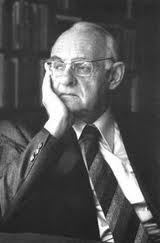Hans Urs von Balthasar's "unique place among the great thinkers of the twentieth century"
The Imaginative Conservative site recently posted an excellent essay, "Uniting Faith and Culture: Hans Urs von Balthasar", by J. Peter Pham, which originally appeared a few years ago in Modern Age. It's worth reading in its entirety, but here is a representative excerpt:
The index to any one of Balthasar’s
books gives evidence of his erudition, even in areas which most
theologians would consider beyond their purview. He studied the message
of the great poets from Homer to Claudel, examining in between the works
of Dante, Calderón, Goethe, and Hölderlin, among others. In his search
for the tools to express the dramatic

character of Christian revelation,
Balthasar delved into world theater from Sophocles to Ionesco. He
analyzed the works of painters like Dürer and Rouault and commented on
the music of Mozart, Mahler, and Schumann.
What characterized Balthasar’s
approach—and it could be said, as well, what characterizes the Western
civilization he embodied—was an openness to other voices even as he
concentrated on his own mission. Like a great composer, he succeeded in
harmonizing different voices and orchestrated his symphonic masterpiece.
(Not surprisingly, Balthasar once penned a little volume on Christian
pluralism entitled Truth is Symphonic.[11]) However, as Béguin
noted, “this dramaturgical talent—which calls, as always, for a setting
of the stage on the personal level as well as a setting on the level of
the common history of mankind—is unceasingly supernaturalized by the key
to his composition, which gives him his Christo-centrism.”[12] In fact,
whatever the object of his immediate theological attention, Balthasar
always returned to another object, the “Heart of the World,” which is
the second Person of the Trinity.[13] Like the great Church Fathers,
Balthasar’s openness to the riches of culture was rooted in his openness
to the Logos, the eternal Word of God, which is the ordering center of all the wisdom of the world.
Already in The Apocalypse, his
earliest work, Balthasar had developed a method of interpretation,
inspired by phenomenology, through which he could elucidate how the
German idealism of Kant, Hegel, Nietszche, and others evolved towards an
idea of the Absolute that was reduced, little by little, to the measure
of man. This phenomenological method was directed toward eliciting the
form that constitutes the center of inspiration in a developing idea. In
this regard, Balthasar repudiated the various schools of modern thought
which sought to separate form and content (the “great divorce” as C.S.
Lewis put it), such as the structuralism that arose from the linguistics
of Ferdinand de Saussure, which explicitly separated word from meaning,
a dichotomy that has been the driving force behind much of revisionist
history.
At the center of Balthasar’s own mission as interpreter of Western culture is the conviction that:
The Christian [does not] need to leave
his center in Christ in order to mediate him to the world, to understand
his relation to the world, to build a bridge between revelation and
nature, philosophy and theology….This is what the saints are fully aware
of. They never at any moment leave their center in Christ….When they
philosophize, they do so as Christians, which means as believers, as
theologians.[14]
Thus, unlike many contemporary
theologians, Balthasar was a champion of the saints, expending not
inconsiderable energies on analyses of the mysticism of Thérèse of
Lisieux, Elizabeth of the Trinity, and, of course, Adrienne von Speyr.
According to Balthasar, the tireless advocate of a praying theology (kniende-theologie), the saints alone, being caught up entirely by the divine word, are capable of speaking correctly about God.
Balthasar’s work as an interpreter of Western culture reaches its climax in the third volume of The Glory of the Lord, subtitled The Realm of Metaphysics,[15] which
deals with the historical evolution of the theme of the glory of God in
metaphysics. This work is particularly significant because of the
theological diagnosis which Balthasar elaborates concerning Western
culture and the challenges which it faces in the contemporary world from
feminism, environmentalism, relativism, and a host of other radical
iconoclastic movements.
Read the entire essay at TheImaginativeConservative.org. For more about von Balthasar, including a complete list of his books published by Ignaitus Press, visit the von Balthasar author page on Ignatius Insight.
Carl E. Olson's Blog
- Carl E. Olson's profile
- 20 followers



